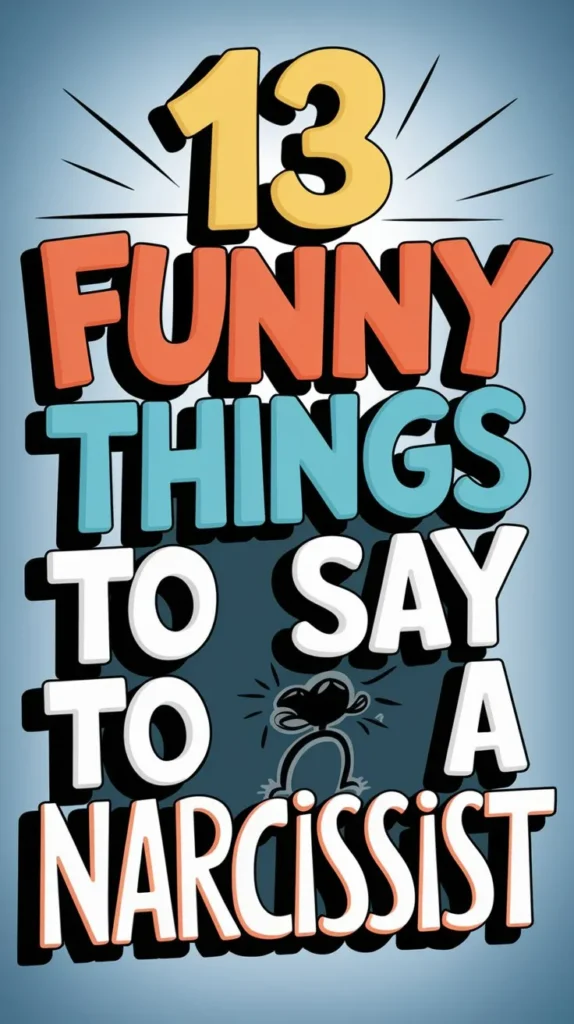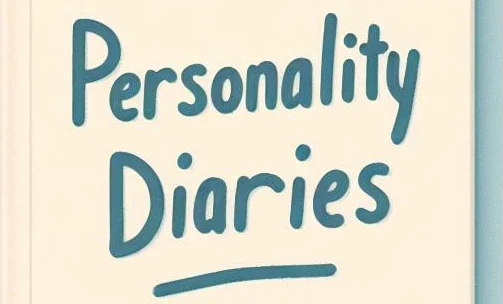When you’re stuck in a conversation with a narcissist, it’s easy to feel like you’re trapped in a never-ending cycle of self-praise and condescension. But what if you could flip the script and turn their own ego against them?
With the right wit and timing, you can use humor to deftly deflect their boasts and shift the focus back to reality. Imagine being able to respond to their outlandish claims with a witty remark that leaves them stunned and you smiling. Want to know the secrets to mastering this delicate art?
In a Nutshell

- Using humor to reframe criticism turns it into a compliment, taking back control of the conversation.
- Playing dumb by asking for detailed explanations of condescending comments forces narcissists to confront their own absurdity.
- Pretending to be impressed by a narcissist’s supposed accomplishments can diffuse tension and redirect the conversation.
- Asking for clarification or repetition of a comment can make narcissists realize the foolishness of their words.
Redirecting the Conversation Flow
When you find yourself stuck in a conversation that’s going nowhere, you can redirect the flow by injecting a clever comment or question that shifts the focus to a more interesting or humorous topic.
This skill is essential when dealing with narcissists, who often dominate conversations with self-centered talk.
By becoming a flow controller, you can steer the conversation towards more engaging and lighthearted subjects.
To do this, prepare some conversation starters that are both clever and non-confrontational.
For instance, you could ask about a recent event or a popular TV show.
By doing so, you’re not only redirecting the conversation but also showing genuine interest in the other person.
Remember, the goal is to create a more enjoyable and balanced conversation, not to confront or challenge the narcissist.
Deftly Deflecting Self-Praise
You can skillfully deflect self-praise by acknowledging the narcissist’s accomplishment without feeding their ego, which helps to maintain a balanced conversation.
This approach allows you to show appreciation for their achievement while avoiding excessive flattery. By doing so, you’re performing an ego check, subtly reminding them that their self-importance isn’t the only focus.
When you respond with a neutral or humble tone, it’s a self-awareness test for the narcissist, as they’re forced to confront their own motivations and reactions.
For instance, if they boast about a recent success, you could say, ‘That’s great news! I’m happy for you.’ This response acknowledges their achievement without adding fuel to their ego fire.
Alternatively, you could shift the focus to the team or others involved, saying, ‘I’m sure it was a team effort. What was the most challenging part of the project?’
By deflecting self-praise, you’re creating space for a more meaningful and balanced conversation.
Lighthearted Ways to Say No
Learning to say no without offending others is an art that requires finesse, and using lighthearted phrases can help you decline requests without damaging relationships.
When dealing with narcissists, it’s crucial to maintain polite refusals while setting firm boundaries. You can’t let their charm or guilt trips sway you into overcommitting.
‘I’m on a mission to prioritize my own sanity, and that means saying no to this request. Wish me luck!’
‘I’m not saying no because I don’t want to help, but because I want to avoid burning out. Let’s find another way!’
‘I’m trying to be more intentional with my time, and this doesn’t align with my current goals. Maybe next time?’
Humorous Boundaries Setting
Humorous Boundaries Setting
Setting boundaries can be a formidable task, but injecting humor into the process can make it more palatable and even help others respect your limits more readily. When you set boundaries with a dash of humor, you’re not only asserting yourself but also showing others that you’re confident and willing to stand up for yourself.
Here are some examples of boundary humor in action:
| Situation | Serious Response | Humorous Response |
|---|---|---|
| Someone asking for a favor | “I’m not available to help.” | “I’m on a top-secret mission to watch Netflix all day.” |
| Someone pushing your limits | “That’s not okay with me.” | “I’m allergic to disrespect; can we try that again?” |
| Someone asking for your time | “I don’t have time for that.” | “My schedule is full of cat naps and coffee breaks.” |
| Someone trying to guilt-trip you | “I’m not responsible for your emotions.” | “I’m not a feelings manager; that’s not in my job description.” |
| Someone trying to manipulate you | “I’m not comfortable with that.” | “I’m on a strict diet of honesty and respect; can we stick to that?”
The Art of Sarcasm Done Right
When you master the art of sarcasm, you’ll find that a well-timed comeback or witty one-liner can be a powerful tool in your humor arsenal.
You’re about to learn how to craft responses that are both humorous and clever, without coming across as mean-spirited or aggressive.
Sarcastic Comebacks Ahead
Are you prepared to master the subtle yet powerful art of sarcasm, where a well-timed comeback can be both a shield and a sword in everyday conversations? Sarcasm can be a delicate dance, but when done right, it can be a potent tool for maneuvering interactions with narcissists.
To wield sarcasm effectively, you’ll need to adopt a tone that’s equal parts playful and piercing.
A well-crafted sarcastic comeback can leave the narcissist momentarily stunned, giving you the upper hand in the conversation.
Respond to an inflated claim with a backhanded compliment, like ‘Wow, I’m impressed you managed to do that. I didn’t know you were capable of so much.’
Use a sarcastic tone to express mock admiration, saying something like ‘Oh, great, another brilliant idea from you. I’m sure it’ll be a huge success.’
Turn the tables by redirecting their criticism back at them, saying ‘Thanks for the feedback, but I think you’re the one who needs to work on that.’
Witty One-Liners Only
A well-crafted one-liner can be a masterclass in subtlety, conveying a wealth of sarcasm and humor in just a few, well-chosen words.
When dealing with a narcissist, a witty one-liner can be your best defense against their manipulative tactics. Crucial to deliver these lines with a poker face, avoiding any emotional cues that might fuel their ego.
Your goal is to leave them speechless, not to engage in a lengthy argument.
A well-timed, clever quip can be a powerful tool in disarming their narcissistic behavior. Think of it as a verbal ‘mic drop’ that leaves them stunned and confused.
Turning Tables With Wit
When you’re faced with a witty remark or a sarcastic comment, you can either take it on the chin or turn the tables with an even wittier response.
By mastering the art of flipping the script, you’ll be able to deflect criticism and steer the conversation in a more humorous direction.
With a few clever comebacks up your sleeve, you’ll be well-equipped to outwit your opponents and leave them in stitches.
Flip the Script
Six clever ways to flip the script on a witty remark can instantly turn an awkward conversation into a hilarious exchange.
When dealing with a narcissist, it’s crucial to be prepared to think on your feet and respond with quick wit. One effective way to do this is by using role reversal, where you turn the tables and make them the subject of the joke.
Mirror their behavior: When they make a condescending comment, respond with an equally condescending remark, but make it obvious you’re being sarcastic. This will catch them off guard and make them realize their own behavior.
Make it about them: When they try to make a joke at your expense, turn it around and make it about them. This will shift the focus back to them and make them uncomfortable.
Play dumb: When they try to belittle you, respond with a confused expression and ask them to explain what they mean. This will make them feel like they need to justify themselves, giving you the upper hand.
Sarcastic Comebacks Only
Your wit is about to get a serious workout with these sarcastic comebacks that will turn the tables on anyone trying to get under your skin.
When dealing with a narcissist, being adequately equipped is vital with sassy responses that will leave them speechless. Remember, the goal isn’t to engage in an argument, but to maintain your dignity and confidence.
Clever ripostes can be an effective way to shut down their condescending comments and gaslighting tactics.
For instance, when they try to make you feel guilty or responsible for their actions, respond with a witty remark like, ‘Wow, I didn’t know I’d that much power over you!’ or ‘You must be joking, right?’ These clever comebacks won’t only take them aback but also make them realize that you’re not buying into their manipulation.
Wit Over Whining
By mastering the art of wit over whining, you can turn the tables on critics and naysayers, transforming potential put-downs into opportunities to showcase your cleverness and confidence.
When dealing with narcissists, maintaining a sense of humor and wit is vital. Witty banter can be an effective way to deflect their criticisms and put them in their place. Instead of getting defensive, try to respond with clever humor that leaves them speechless. This approach not only shows them that you won’t be intimidated but also demonstrates your intelligence and confidence.
Using wit over whining has several benefits:
- It keeps the narcissist on their toes, making them less likely to try to control or manipulate you.
- It showcases your ability to think on your feet and respond quickly to criticism.
Subtly Shifting Attention Away
When you’re stuck in an awkward conversation, deftly deploying a clever quip can subtly shift attention away from the uncomfortable topic and onto more lighthearted grounds.
This tactic is especially helpful when dealing with attention seekers, who often steer conversations towards themselves. By shifting gears, you can redirect the conversation’s focus and create a more balanced dynamic.
To master this technique, try using humor to pivot the conversation.
For instance, if the narcissist starts bragging about their latest achievement, you could say, ‘Wow, that’s impressive! But speaking of achievements, have you seen that new [movie/TV show]? I heard it’s amazing.’ This response acknowledges their accomplishment while gently steering the conversation towards a more neutral topic.
Playful Teasing With a Purpose
When you master playful teasing with a purpose, you’ll find that it’s a delicate balance between lighthearted humor and targeted prodding.
You’ll need to know when to throw in a witty jab that’s allowed to land, and when to zero in on someone’s soft spot – like a narcissist’s vulnerability.
Lighthearted Jabs Allowed
Using playful teasing with a purpose, you can cleverly inject humor into conversations, making them more enjoyable and lighthearted. This approach allows you to poke fun at the narcissist’s ego without triggering their defenses. By doing so, you can create a more relaxed atmosphere, making it easier to navigate conversations.
Use tone tweaks to convey playful sarcasm, making it clear you’re not being serious. For example, ‘Oh, wow, I’m so impressed you managed to take a selfie without making a duck face.”
Employ sarcasm shields to deflect their potential reactions. When they respond with anger or defensiveness, simply say, ‘Oh, I was just joking! Don’t be so sensitive.”
Make humorous observations that poke fun at the situation, rather than the person. For instance, ‘I think the coffee machine is more interesting than our conversation right now.’
Narcissist’s Soft Spot Found
By identifying a narcissist’s soft spot, you can craft playful teases that tap into their vulnerability, making them more receptive to your humor and less likely to become defensive.
This approach requires empathy and understanding, as you need to recognize the narcissist’s weakness without exploiting it. When you find their soft spot, you can use lighthearted, non-confrontational humor to create a sense of connection and playfulness.
A narcissist’s soft spot often lies in their deep-seated insecurities, which they may mask with arrogance or grandiosity.
By gently poking fun at these insecurities, you can create a sense of mutual understanding and shared humanity. This can help the narcissist relax their guard and become more open to your humor.
However, it’s crucial to maintain a respectful tone and avoid mocking or belittling them. Remember, the goal is to build a connection, not to humiliate or expose their weakness.
Teasing to Expose Ego
You can employ playful teasing to expose a narcissist’s ego, carefully crafting lighthearted jokes that gently highlight their self-importance. This approach can be an effective way to subtly nudge them into recognizing their own flaws, without directly confronting them. By using playful jabs, you can create a sense of discomfort that encourages them to re-examine their behavior.
When done correctly, ego probing can be a powerful tool in your interactions with a narcissist.
Make a humorous comment about their tendency to dominate conversations, saying something like, ‘Wow, I’m impressed by your ability to talk about yourself for hours on end!’
Lightheartedly poke fun at their need for constant validation, saying, ‘I’m starting to think you have a PhD in fishing for compliments!’
Use irony to highlight their self-absorption, saying, ‘I’m shocked you didn’t take credit for inventing the internet – after all, you’re an expert on everything!’
Remember to keep your tone light and playful, avoiding any direct attacks or criticisms. By using humor to expose their ego, you can create a sense of awareness and accountability without triggering their defenses.
Cutting Remarks With a Smile
When you master the art of delivering clever comebacks with a disarming smile, even the toughest critics will struggle to stay mad at you.
This tactic is particularly effective when dealing with a narcissist, as it allows you to simultaneously check their ego and slash their condescending attitude. By combining wit with a charming grin, you can diffuse tension and turn the tables on their insults.
Remember, the goal isn’t to escalate the situation, but to assert your confidence and independence.
A well-timed quip can be a powerful tool in your arsenal, allowing you to maintain your composure while still addressing the narcissist’s behavior.
For instance, if they make a snide comment about your appearance, you could respond with a lighthearted joke about your own flaws, effectively neutralizing their attack.
Joking Your Way to Sanity
Staying sane in the midst of narcissistic chaos often requires a healthy dose of humor, which can be your secret weapon to deflect their toxic behavior and reclaim your emotional balance. When you learn to joke your way through the madness, you’re not only protecting your sanity but also taking back control of your life.
Set aside time each day to watch funny videos, read humorous articles, or hang out with people who make you laugh. This will help shift your focus away from the narcissist’s drama and towards positivity.
Develop a witty comeback or a humorous remark to deflect the narcissist’s negative comments. This will help you maintain your confidence and composure in the face of their toxic behavior.
Use humor to process your emotions and deal with the stress of being around a narcissist. Laughter can be a powerful tool in helping you cope with the chaos and maintain your emotional balance.
Silly Comebacks for Narcissist
Dealing with a narcissist’s condescending remarks can be a daily struggle, but having a few silly comebacks up your sleeve can help turn the tables and shift the spotlight away from their drama.
You become their narcissist nemesis, cleverly deflating their ego with a well-timed witty remark. When they try to belittle you, respond with a lighthearted, ‘Oh, I’m so sorry, I forgot I’m supposed to be intimidated by your greatness.’ This silly sabotage throws them off guard, making it harder for them to maintain their superior attitude.
Another approach is to play dumb, asking them to explain their condescending comment in excruciating detail. This forces them to confront the absurdity of their own words, making them look foolish.
You can also use humor to reframe their criticism, turning it into a compliment. For example, ‘Wow, I’m flattered you think I’m capable of such amazing failures!’ By using these silly comebacks, you take back control of the conversation, refusing to be drawn into their drama.
Redirecting Self-Focus to Others
By shifting the spotlight onto others, you can cleverly redirect a narcissist’s self-absorption, forcing them to acknowledge the people and world around them. This subtle yet powerful technique can help them develop a sense of empathy and understanding, even if it’s just for a moment.
Ask open-ended questions about others, such as ‘What do you think they meant by that?’ or ‘How do you think that person felt in that situation?’
Share a story or anecdote about someone else, and ask for their opinion or feedback
Make a lighthearted comment about someone else’s achievement or success, and ask them to share their thoughts on it
Witty One-Liners to Defuse
When confronted with a narcissist’s provocative comment, you can deploy a well-crafted witty one-liner to defuse the tension and redirect the conversation.
This approach allows you to maintain your emotional balance while subtly shifting the focus away from their egocentric remarks. Think of these witty one-liners as clever dodges, expertly sidestepping the narcissist’s attempts to provoke you.
By using humor, you can create a witty shield that protects you from getting drawn into their drama. For instance, if they say, ‘You’re so lucky to have me in your life,’ you could respond with, ‘I must be doing something right, then!’ This lighthearted response acknowledges their comment without feeding their ego.
Remember, the goal isn’t to engage in a battle of wits but to redirect the conversation towards more constructive topics.
When you master the art of witty one-liners, you’ll find that you’re better equipped to handle narcissistic behavior. You’ll no longer feel like you’re walking on eggshells around them, and you’ll be more confident in your ability to maintain a sense of freedom and emotional autonomy.
Frequently Asked Questions
Can Narcissists Change Their Behavior With Enough Motivation?
You wonder if narcissists can change their behavior with enough motivation. While it’s challenging, personal growth is possible through therapy benefits, such as self-reflection and empathy development, allowing them to recognize and adjust their harmful patterns.
How Do I Avoid Being Drawn Into Their Drama?
To avoid being drawn into their drama, you set clear boundaries, maintaining emotional distance by prioritizing self-care and not internalizing their emotions, allowing you to respond, not react, and break free from their manipulative grasp.
What if They Become Aggressive When Rejected?
If they become aggressive when rejected, you’ll need to prioritize self-protection. Set clear boundaries and avoid triggers that fuel their anger. Stay calm, firm, and assertive, and have a plan in place to guarantee your emotional and physical safety.
Can I Use Humor to Handle Narcissistic Family Members?
When dealing with narcissistic family members, you can use humor as a shield to deflect their criticism, setting sarcastic boundaries to maintain your emotional distance, protecting your freedom and emotional well-being.
Will They Eventually Get Tired of Being Mocked?
You wonder if they’ll eventually get tired of being mocked, but narcissists often have a high mocking tolerance. Emotional exhaustion might set in, but it’s uncertain when or if they’ll reach that point, so be prepared for a long-term strategy.






James Green is a seasoned psychologist specializing in narcissism and other personality and relationship issues. With a passion for helping others understand and navigate their own personality traits and relationships, James shares his insights and expertise on his blog, Personality Diaries. Connect with him on Pinterest and Instagram for regular updates and insights.



















































